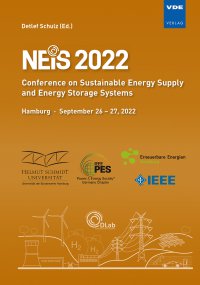Optimal Energy Scheduling for a Microgrid with Battery and Hydrogen Storage
Konferenz: NEIS 2022 - Conference on Sustainable Energy Supply and Energy Storage Systems
26.09.2022 - 27.09.2022 in Hamburg, Germany
Tagungsband: NEIS 2022
Seiten: 6Sprache: EnglischTyp: PDF
Autoren:
Sassen, Simon; Fink, Andreas (Helmut Schmidt University, Institute of Computer Science, Hamburg, Germany)
Inhalt:
With the expansion of renewable energies, hydrogen can play a key role as an energy storage medium. Feed-in tariffs for new photovoltaic plants are falling and end-user prices are rising. Therefore, it looks more and more promising to store the energy from a photovoltaic system to cover one's own electricity needs. However, high investment costs and energy conversion losses are obstacles to the profitable use of hydrogen. So far, it has not been sufficiently researched how the energy use in a microgrid with photovoltaic system and hydrogen storage can be efficiently planned from the point of view of an electricity end customer and whether such a configuration is economically worthwhile compared to other energy systems. In this paper, we present a linear optimization model for scheduling energy storage within a microgrid. One question is whether a connection of the microgrid to the public grid is essential. A distinction is made between two remuneration models; the first is characterized by constant prices and the second has fluctuating prices. The electricity generation costs are calculated for different energy systems consisting of a photovoltaic system and a battery and hydrogen storage system. For the considered scenario, none of the energy systems is directly profitable under the assumed conditions, even with a subsidy for hydrogen systems. In addition, the direct sale of hydrogen can be more profitable than reverse energy generation to avoid drawing electricity from the public grid.


